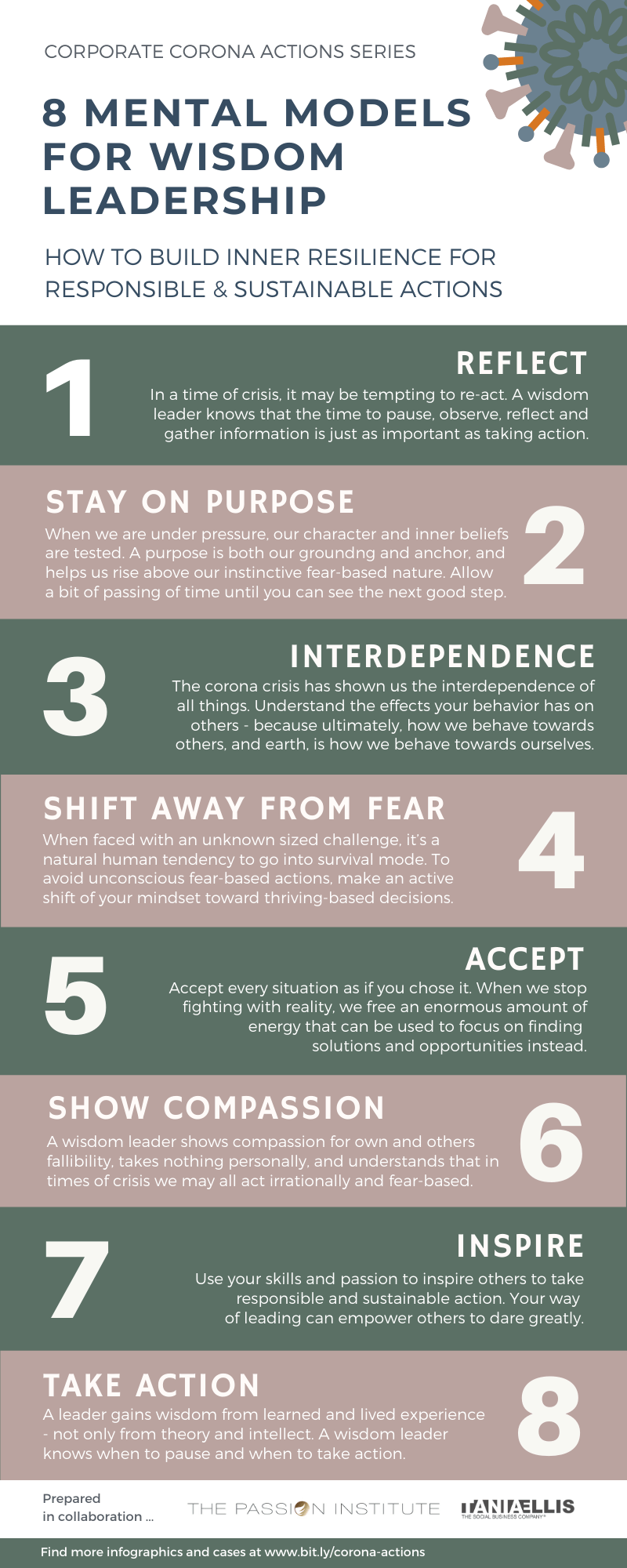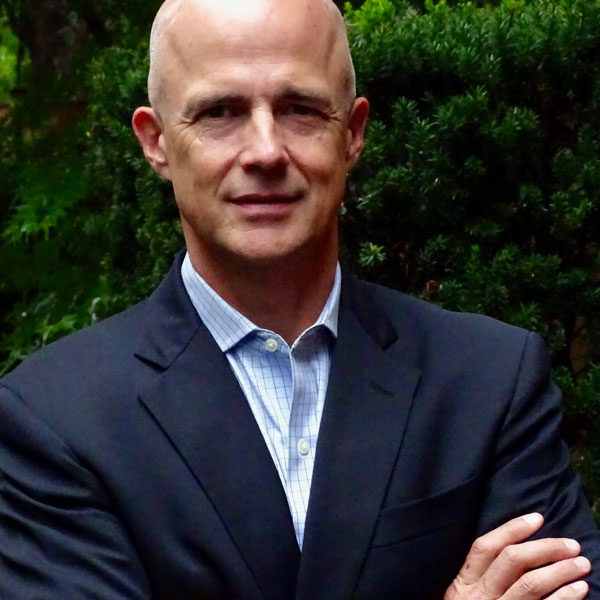
Tim Docking
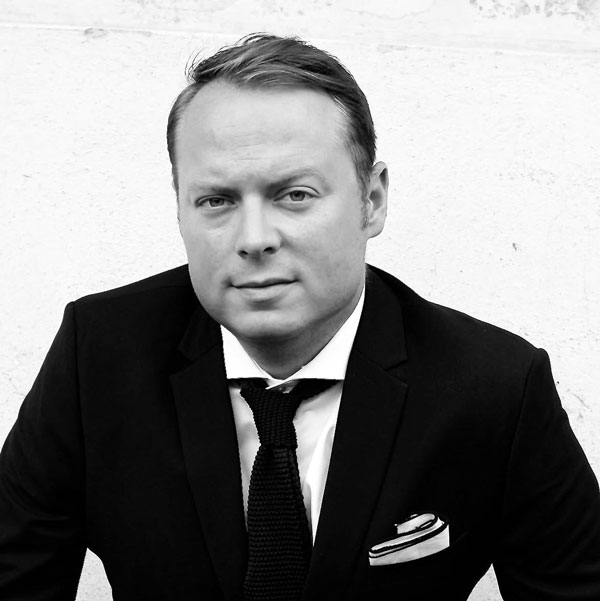
John Kluge
Unprecedented numbers of men, women, and children are fleeing South Sudan, Afghanistan, Syria, and other nations torn by violence and conflict. There are currently 68.5 million forcibly displaced people worldwide including 25 million refugees according to the UN Refugee Agency UNHCR. John Kluge and Tim Docking believe that the key to unlocking innovative solutions that help refugees is increased capital investment. Their organization, the Refugee Investment Network (RIN), is the first blended finance investment collaborative dedicated to creating long-term solutions to global forced migration. Kluge is RIN’s Founder and Docking is Managing Director. They are working with the SOCAP content team to develop the Refugee track sessions at SOCAP18. We recently spoke with Kluge and Docking to discuss some of the innovative ways that the business and investment communities can collaborate to help displaced people worldwide, and to preview some of the Refugee Track sessions that will take place at this year’s SOCAP.
SOCAP: What do you wish more people knew about the state of the refugee crisis today?
John Kluge: Much as climate change is the defining environmental challenge of our time, we see increased and spreading forced global migration as the defining social crisis of our time. If we simply bury our heads in the sand and don’t do anything today, the current crisis–with conflicts around the world and unheard of levels of displacement–could look simple compared to tomorrow. If you look at current trends, displacement could rise from 68 million people today to between 180 to 300 million by 2030. These estimates take into account demographic growth, rising issues around youth expectations, climate change, economic growth, and other factors.
The causes and effects of the global refugee crisis are terrible and challenging, but we see this as an opportunity for innovative solutions. The good news is that there are opportunities to invest in and invest with refugees. There are also opportunities to invest in local businesses in emerging markets that employ displaced people and provide them with goods and services.
This type of investment is good for Americans, good for investors and economies, good for our allies overseas who are shouldering the bulk of the burden, and it is good for refugees and the communities that are hosting them. This is an emerging investor market, one that is filled with urgency, need, and opportunity.
Tim Docking: I feel strongly that refugees are investable. We’ve set out to prove that. While changing the narrative surrounding refugees will be challenging, as John suggested, it is completely tenable. We think that when all of the social capital that is out there starts to see bankable deals and hear the corresponding success stories about the positive socio-economic development in refugee communities, we’ll see widespread engagement from the investor community.
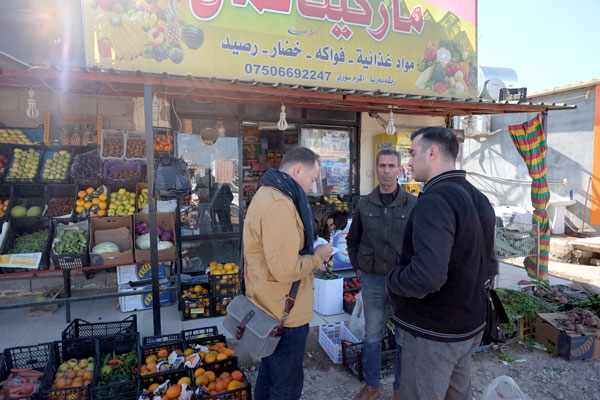
John Kluge interviews a Syrian refugee business owner who was able to rebuild his grocery retail operation in Iraq with start-up financing from the Dutch government
SOCAP: Why do you believe this a critical conversation the SOCAP community should be having now?
John Kluge: This is an issue whose time has come. Momentum has been building. The community working on long term solutions has been growing consistently and you will see that reflected at SOCAP. This will be the first time that the issue of refugees will take the main stage at the conference.
The conversation intersects with many SOCAP18 themes. Half of refugees are women. Much of the displacement is occurring on the continent of Africa. Many of the countries at the center of the refugee crisis are tough places to do business, so finding the right instruments and ways of incentivizing capital to get into these markets is also important.
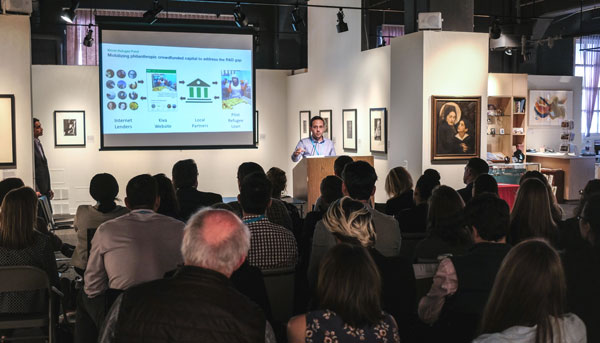
Lev Plaves from Kiva introduces the World Refugee Fund at SOCAP17
SOCAP: Can you give examples of some of the different innovative investment approaches to helping refugees?
Tim Docking: The emerging field of blended finance is one. Blended finance can mean a number of things to different people, but generally it is the blending of different funding mechanisms. Funds from the philanthropic, public and private sectors are blended together through innovative structures that incentivize investment and the long-term placement of capital. Blended financial approaches to development often involve some of the big players. International financial institutions like the World Bank, along with development finance institutions like the Overseas Private Investment Corporation (OPIC), bring together their tools and instruments that extend concessionary financing and de-risking schemes like political risk insurance, to attract private investment from across the capital continuum to insure, leverage and scale social investments.
These investments are often in tough neighborhoods so creative, innovative financial mechanisms are really necessary to give private sector investors an increased sense of confidence in these new markets. And we can see an emerging appreciation between these new partners: The humanitarian and development communities are placing increased importance and value on private sector efficiency and rigor along with the increased capital flows they bring, while elements of the private sector are beginning to understand and appreciate the incredible value that development partners, with their local knowledge, reliable due diligence and de-risking mechanisms can bring to deals. We maintain that through the blending of innovative finance for large scale deals, we’ll find the success we need to pull investments into new markets aimed at improving the lives of refugees and their hosts.
John Kluge: To build on Tim’s context, this is an all-hands-on-deck issue. We need every kind of capital at the table to have a role in creating and growing these markets where there are large displaced populations. That means catalytic philanthropic capital that can help test, experiment, and prove new models or to help provide the derisking support that Tim was describing. It means concessionary capital that looks at debt opportunities that may not offer high returns, but still solid, risk adjusted returns. For example, some of the small and medium sized enterprises (SMEs) in these markets that are hiring refugees are looking for growth financing and are offering between 3-7%. Commercial capital is also needed to help scale solutions that are working. All of that capital, both private and public, has to be part of the solution here.
On the deal side, we need every layer of a market ecosystem activated as well. This includes microenterprises, SMEs, refugee-led ventures, businesses owned by local citizens, as well as larger scale investment in infrastructure projects. This is where we will draw upon partnerships with OPIC, the International Finance Corporation (IFC) and World Bank’s Global Concessional Financing Facility, which is providing low-interest financing for countries affected by the Syrian crisis.
We are seeing deals at each slice of that ecosystem, both from the capital continuum side with different investors and funders and also on the actual deal side. Foundations and corporations have already proven their value in expanding the market. Here’s a good example: A few years ago, most monetary financial institutions (MFIs) wouldn’t lend to refugees because they were perceived as a higher risk customer. In the last two years, USA for the UNHCR (the U.S. fundraising arm of the UN Refugee Agency), the Alight Fund, Tent Foundation, Miller Family Foundation, and others partnered with Kiva to launch the World Refugee Fund, which was the first global fund dedicated to lending to refugee or displaced entrepreneurs. Kiva used grant support from these organizations to match against citizen lenders on their platform (more than $25 or $50). At Kiva’s 0% interest, they provided over $5M in loans to over 8000 refugee entrepreneurs across five countries, which for local MFIs acted like an R&D fund to experiment with lending to refugees.
Kiva now has data from those entrepreneurs proving that refugees are no more risky than any traditional MFI customer. In fact, in four out of five countries, the repayment rates are higher than normal customers. That philanthropic investment has now led to significant interest from multiple for-profit investors who are interested in structuring and designing investment funds to take equity positions in MFIs that would generate market rate returns. That is a good example of how different capital can work together to build out a piece of the market.
In Greece, there’s an emerging partnership between the Radcliffe Foundation and Open Society Foundation to provide the anchor capital behind The Ascend Fund. As I understand it, Ascend is around 70% fulfilled in its capital raise, and it is still raising. They will be the first impact investing fund specific to a single country supporting refugee and migration related deals, specifically doing SME debt financing. It also has a unique grant-based technical assistance fund that will operate in parallel to support early stage ventures. Eighty percent of the businesses that they are providing financing to are long established Greek family enterprises that are hiring or providing services to migrant populations.
Tim Docking: Just as Kiva has found that refugees are reliable partners, so too are the financial institutions like OPIC or the IFC. They have a long track record of investments in difficult markets and have superlative repayment rates–low-single-digit default rates — over long periods of time. So they really are some of the best investment partners to work with.
John Kluge: A good case study for a blended finance deal started in fact, at SOCAP last year, with KOIS Invest, who have created a development impact bond for refugee livelihoods in Jordan and Lebanon. The design of their bond was supported through blended finance platform Convergence, which is also one of the RIN’s early partners. Since last autumn when this bond was introduced at SOCAP, KOIS has gone through feasibility and design and now they are actually putting those pieces together and have an anchor investor in place. That, I think, is an exciting product and we’ll see more of this from the world of impact bonds.
On the domestic side, you can check out The Massachusetts Pathways to Economic Advancement Project which was developed by Social Finance US and other partners. The initiative was funded by 40 impact investors (including Prudential as a major investor) to support job placement and job training among refugees in the greater Boston area. A few weeks ago, Tracy Palandjian, Social Finance’s CEO told me she was ready to replicate that initiative in other states across the United States.
I think we will see these kinds of instruments continue to replicate and expand in volume as they prove their efficacy. Those are going to be another part of the layer of refugee investment market. We also need to be looking at SMEs, infrastructure, the micro side and larger deals as well.
SOCAP: John, you were just at the Third Vatican Conference on Impact Investing in Rome, where refugees were a major topic of discussion. Can you share an insight you took away from those conversations?
John Kluge: Two big takeaways from the Vatican Conference on Impact Investing: first, the faith community- including the Catholic Church – is deeply committed to aligning investment values with faith values. Second, using our capital resources to support the resiliency and dignity of refugees and migrants is one of the most direct, urgent, and opportune ways to do this. Most of participants at the conference understood the “why” here, but the “how” and the “what” were less clear. How do we engage? How do we design funds for this? Where do we place our capital? Who are the right managers that we can partner with? There’s real demand here. This is one of the reasons we’re building the RIN with the Global Development Incubator.
Capital seems eager to get into this market, especially faith-based capital. The Pope has made a huge commitment to refugees and migrants. It’s very personal to him. The faith-based community is going to help pioneer this space. I’m excited about that. I think it is also a signal that there are others within our community, and within the SOCAP community in particular, who may not be thinking about refugees and migrants as an investment lens. But the more we look at it, the more we learn about it, the more we see how the refugee crisis intersects with other issues we care about, whether our investment lens is gender, climate, financial inclusion, human trafficking, etc. Migration touches everything. The question is, what are each of us doing about it?
SOCAP: You are collaborating now with the SOCAP content team on Refugee track sessions for SOCAP18. What are some of the primary challenges and opportunities that will be addressed in these sessions?
Tim Docking: When bringing different communities together, in the case of the RIN, this involves members from the humanitarian, development and private sector including representatives from across the investor landscape. It’s always a challenge to speak in a voice as well as a professional and technical language that all sides understand. It’s also a challenge to align priorities, objectives and methods across boundaries. So finding that common language, understanding common interests, building trust and a common agenda is a challenge, but it’s both important and achievable.
It’s also important to note that I would not have said this or been so optimistic about our chances of success just a few years ago. However the development landscape is rapidly changing and old walls are being torn down, especially between the private sector and the development community. Declining aid flows combined with a growing appreciation of both the scale of some of the world’s problems — for example the refugee crisis, which we believe is the defining social crisis of our time — have driven development professionals to revisit and look for a new paradigm. The imperative to “turn billions into trillions” has turned sights to the private sector. Meanwhile, for their part, the private sector and investors from across the capital continuum are beginning to look at the changed dynamic, and they see a more welcoming environment in the development and humanitarian community and are looking to partner. But neither side has a lot of experience doing this. There is a lack of knowledge; of intermediaries; of a common language as I said above; and of good, innovative, blended finance success stories. The RIN is helping to provide the missing connective tissue, in particular between impact investment opportunities and sidelined capital.
So I think we need to explore this changing development landscape in our sessions and highlight new and exciting opportunities for impact investors. We also must define what investments that benefit refugees and their host communities look like, how to accelerate the flow of bankable deals, and how we measure success.
This is an opportunity to create new partnerships, to open up the dialogue for fresh ideas, and to bring in more people from the private sector. We also want the private sector to lead. The development and humanitarian communities are ready for the private sector to raise its voice, get out of the backseat and behind the steering wheel.
That is just some of the context as well as the challenges and opportunities that I see emerging from the refugee track sessions that will be address at SOCAP. And we are extremely excited to be a part of these discussions.
SOCAP: What is your call to action for the SOCAP Community?
John Kluge: I would like for the SOCAP Community to consider how each of us can make a difference in this market and to commit to doing something meaningful–not to worry so much about figuring out the “how” and the “what”. Together, we can handle that. If you believe that we should be taking part in creating solutions with refugees and displaced people, and with the host communities that are shouldering the burden of large scale migration, then let’s make that commitment today. And then work with us to figure out the how and the what, as is appropriate for each of us. We are from different fields, and many of us care of about different aspects of global migration–but there is a way in and a way through.
Every person on this planet should have a pathway to safety if they are in peril. But surviving is not the same thing as living. Every one of us should have a pathway to lift ourselves up, to take care of our families, to have a dignified life. With nationalism on the rise and governments in retreat, the role of courageous capital in helping refugees become self-reliant and in building resilient, inclusive, and economically vibrant communities, has never been more urgent or more necessary. We’re excited to embark on effort, but we can’t do it alone. The SOCAP community can lead on this issue. All it takes is a little courage.
Tim Docking: It is time to act. As we build our landscape and talk to our clients in the investment community, what we find is that they want to see action. They want to see bankable deals and investment. They see this as a new frontier, but one that will only open up when we see more focus and research, collaboration and ultimately deal flow. And as we help to move money off the sidelines we intend to create a narrative that proves refugees and their hosts are investable.
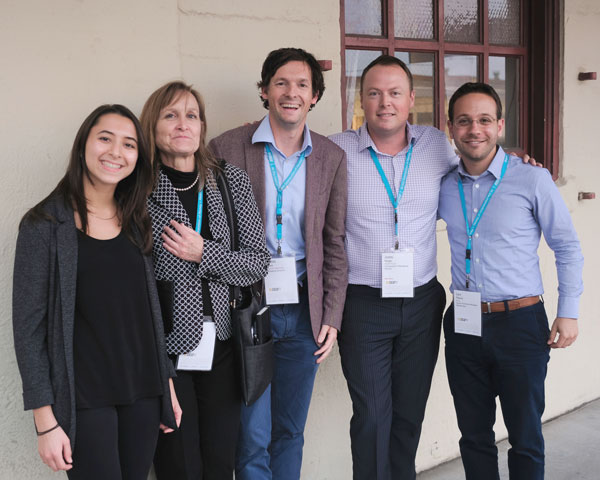
Lev Plaves of Kiva, John Kluge of RIN, Justin Sykes and Michelle McMahon of Innovest Advisory, and Monica Greco, consultant for the Open Society Foundation at SOCAP17
SOCAP: What do you hope will grow out of the Refugee Track sessions at SOCAP18?
John Kluge: As Tim said, we want to see a commitment to action. And that would mean philanthropic funders, impact investors, institutional capital getting into the space- not just committing, but mobilizing their dollars. We’ve seen a lot of money sit on the sidelines. It’s time to get off the sidelines and into the game. This October, we’d like to see deals advanced through dialogue and capitalized by the end of the year. If we can say by January that deals that were part of discussions at SOCAP in October are now moving through due diligence and we see capital getting off the sidelines and into these markets and supporting refugee led businesses, and businesses that are hiring refugees, I think that will be a huge success. In the meantime, we’re building an infrastructure to help support and mobilize more capital to do exactly that.
We are supporting the refugee investment market at a global level, but we also have specific regional focus areas: Jordan, Mexico, and Kenya. We hope to see more deals in those areas. The Mexican government put out a call to action in economic development and investment opportunities for forced migrants and deportees. We think that there are a number of deals that could help with that work. In Kenya we are already seeing social cohesion and relationships improving between the local citizens and refugees through informal commerce. What happens if we can accelerate that by bringing in more capital, technical assistance, and a favorable policy environment? What impact could new partnerships with OPIC or the IFC have?
For those of you who already have investments in emerging markets, think about how you can take your existing equity or debt positions, and use those to incentivize hiring practices for refugees. For asset managers looking to expand their client base, consider that there’s a growing demand for refugee-supporting investments. What products are you offering? For businesses, in search of higher retention rates, hire refugees. This is the beginning of a new market. Let’s grow it together.
Tim Docking: I think our work on refugees is just one manifestation of what we hope will become a trend. That trend is bringing the private sector’s knowledge, innovation, resources (both financial and human), to bear on these incredible global issues, which are too big for any one entity, from the humanitarian community, the public sector, or the development community to deal with alone. We need to come together in new and thoughtful ways to tackle challenges like the global refugee crisis.
I believe that the private sector has been the missing link in solving many of these problems in the past. And while it wasn’t always entirely welcome at the table in the past, it is today. Look at the UN’s Sustainable Development Goals (SDGs). Every one of those goals is predicated on the participation and engagement of the private sector.
The development and humanitarian communities have turned a corner, I believe, in their openness and interest to work with the private sector. The private sector needs to respond. I’m not talking about writing checks, but rather taking a proactive, leadership role in the conversation. Actively innovating, engaging, investing, and advancing the cause of sustainable social and economic development.
